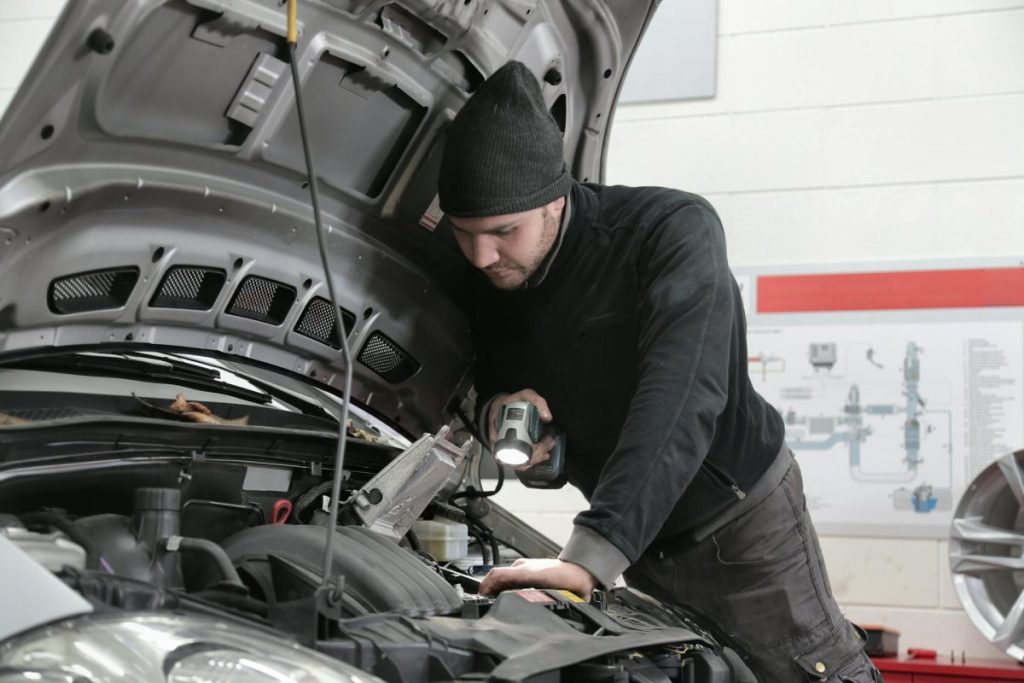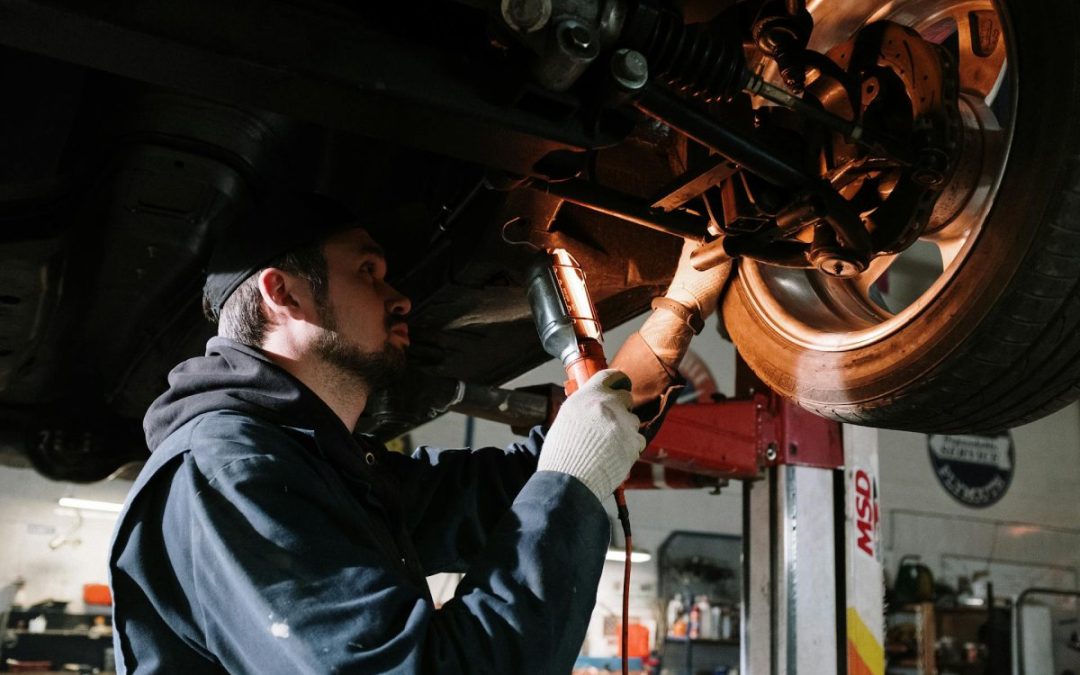Home » From Dashboard Lights to Real Insights: The Role of Car Diagnostics
- Understanding How Diagnostic Tools Help Mechanics Keep Your Vehicle Running Smoothly
- Why Vehicle Dashboard Warning Lights Aren’t Enough
- How Car Mechanics Use Diagnostic Tools to Detect Hidden Issues
- The Benefits of Regular Car Diagnostic Checks
- Common Problems Identified Through Car Diagnostics
- When to Get a Car Diagnostic Test: Signs You Shouldn’t Ignore
- Conclusion: From Insight to Action: Why Car Diagnostics Are Essential for Every Driver
- Frequently Asked Questions
- Fargo Car Diagnostic Service
- Moorhead Car Diagnostic Service
Understanding How Diagnostic Tools Help Mechanics Keep Your Vehicle Running Smoothly

Picture this: You’re driving along, minding your business, and suddenly a mysterious light illuminates on your dashboard. Is it serious? Can you ignore it? Or is your car on the verge of a breakdown? It’s a common scenario that many drivers face, and it often leads to a mix of confusion and concern. This is where car diagnostics come into play.
Gone are the days when car repair was solely about wrenches and guessing games. Today’s vehicles are sophisticated machines, more like computers on wheels. This means that fixing them requires more than just a good ear and a set of tools; it demands precise information. That’s why vehicle diagnostic tests have become an essential part of modern auto repair. These tests allow skilled auto mechanics to look deep into your car’s computer system, uncovering issues that might not be obvious from the outside.
At Matt’s Automotive Service Center, with our locations in Fargo-Moorhead and Minneapolis-St. Paul, we’ve seen how crucial accurate diagnostics are. As a family-owned and operated business, we remain updated with the latest advancements in automotive technology, and we’re committed to earning and maintaining the trust of our customers. Our goal is to set a new benchmark in the industry, and that starts with providing top-notch service, beginning with a thorough understanding of your vehicle’s health.
Why Vehicle Dashboard Warning Lights Aren’t Enough
Those little lights on your dashboard—the check engine light, the ABS light, the battery light, and many others—are designed to grab your attention. They’re definitely important, acting as your car’s first line of communication. But here’s the thing: they’re often just the tip of the iceberg.
Think of a dashboard warning light as a general alert. When your check engine light comes on, for example, it tells you there’s something wrong with the engine, but it doesn’t tell you what. Is it a loose gas cap, a failing oxygen sensor, or something far more serious like a catalytic converter issue? Without a proper check engine light inspection using specialized tools, you’re left guessing.
Relying solely on these lights is like trying to diagnose a human illness based only on a fever. A fever tells you something’s wrong, but it doesn’t pinpoint the flu, a cold, or a more serious infection. Similarly, your car’s warning lights indicate a problem but lack the specific details needed for an accurate repair. This is why a comprehensive diagnostic scan for cars using the latest technology is indispensable. It provides the detailed codes that tell a mechanic exactly what’s going on under the hood, saving you time, money, and potential headaches down the road.
How Car Mechanics Use Diagnostic Tools to Detect Hidden Issues
Modern vehicles are equipped with an onboard computer system, often called the Engine Control Unit (ECU), which constantly monitors various sensors throughout the car. These sensors track everything from engine performance and exhaust emissions to transmission function and braking systems. When a sensor detects something outside its normal operating range, it sends a trouble code to the ECU, and this is where automotive diagnostics truly shine.
When you bring your car to an auto repair shop like Matt’s Automotive Service Center for a diagnostic test, our mechanics connect a specialized diagnostic scanner to your vehicle’s computer port. This scanner then “talks” to your car’s ECU, retrieving any stored trouble codes. These codes are not random; each one corresponds to a specific issue or malfunction within the car’s systems.
But retrieving codes is just the first step. A skilled mechanic doesn’t just read the code and replace a part. They use their expertise to interpret the codes in context, considering other symptoms the car might be exhibiting. For example, a single code might be triggered by several different underlying problems. Our car mechanics will then perform further tests, using their knowledge and experience to pinpoint the exact cause of the issue. This might involve checking wiring, testing components, or monitoring real-time data from the sensors to understand how the car is performing under various conditions. This thorough approach is what makes a professional car diagnostic service invaluable. It allows us to accurately diagnose the problem the first time, preventing unnecessary repairs and ensuring your vehicle is fixed correctly.
The Benefits of Regular Car Diagnostic Checks
You might think that car diagnostics are only necessary when a warning light comes on or when your car starts acting up. However, getting regular diagnostic checks offers numerous benefits, even if your car seems to be running perfectly fine. Think of it as a preventative health check for your vehicle.
Early Problem Detection
One of the biggest advantages is early problem detection. A diagnostic scan can often pick up on small issues before they escalate into major, costly repairs. For instance, a sensor that’s slowly failing might not trigger a dashboard light immediately, but a diagnostic tool could identify it as performing outside its optimal range. Addressing these minor issues proactively can save you a significant amount of money and inconvenience in the long run. This is a key reason why car diagnostics are important.
Improved Fuel Efficiency
Another benefit is improved fuel efficiency. Many engine-related issues, even subtle ones, can negatively impact your car’s fuel economy. A diagnostic test can pinpoint these inefficiencies, allowing for adjustments or repairs that can help your car run more efficiently, saving you money at the pump.
Enhanced Safety
Regular diagnostics also contribute to enhanced safety. Issues with your braking system, airbags, or steering can be detected through a comprehensive scan, ensuring these critical safety features are functioning correctly. This gives you peace of mind knowing your vehicle is as safe as possible on the road.
Extend The Lifespan Of Your Vehicle
Finally, consistent diagnostic checks help extend the lifespan of your vehicle. By keeping all systems in optimal working order, you reduce wear and tear on components, helping your car last longer and maintain its value. It’s a smart investment in your vehicle’s future.
Common Problems Identified Through Car Diagnostics
Car diagnostics are powerful tools for uncovering a wide array of automotive issues, both major and minor. While the check engine light is often the trigger for a diagnostic test, these scans can reveal problems in various systems throughout your vehicle.
Here are some common issues that are frequently identified through a comprehensive diagnostic scan for cars:
- Engine Performance Issues: This is perhaps the most common area where diagnostics shine. They can detect problems with ignition systems (spark plugs, coils), fuel delivery (fuel injectors, fuel pump), air intake (mass airflow sensor, oxygen sensors), and exhaust systems (catalytic converter, O2 sensors). These issues can lead to reduced power, poor fuel economy, rough idling, or even engine misfires. Engine diagnostics are crucial for keeping your vehicle’s heart healthy.
- Transmission Problems: Issues with your car’s transmission can lead to rough shifting, slipping gears, or even complete transmission failure. Diagnostic tools can pinpoint problems with transmission fluid pressure, solenoids, or internal sensors, allowing for timely repairs that can save you from a very expensive transmission overhaul.
- Braking System Faults: Modern vehicles have complex braking systems, including Anti-lock Braking Systems (ABS) and traction control. Diagnostic scans can identify issues with ABS sensors, wheel speed sensors, and other components that could compromise your braking ability, ensuring your safety on the road.
- Emission System Malfunctions: Many diagnostic codes are related to your car’s emission control system. Problems with oxygen sensors, catalytic converters, or the Evaporative Emission Control (EVAP) system can cause your car to fail emission tests and contribute to environmental pollution. Diagnostics help identify these issues, ensuring your car runs cleaner.
- Electrical System Glitches: From battery and alternator problems to issues with wiring and various electrical components (like power windows or climate control), diagnostic tools can help trace and pinpoint electrical faults that can be notoriously difficult to find otherwise.
- Airbag System Problems: If there’s an issue with your car’s airbag system, a diagnostic scan can identify which sensor or component is malfunctioning, ensuring that this crucial safety feature is ready to deploy if needed.
These are just a few examples, but they illustrate the breadth of issues that a thorough diagnostic test can uncover. It’s truly a comprehensive health check for your vehicle’s intricate systems.
When to Get a Car Diagnostic Test: Signs You Shouldn’t Ignore
Knowing when to get a car diagnostic test is just as important as understanding what it does. While the most obvious sign is a dashboard warning light, there are many other signs your car needs diagnostics that you shouldn’t ignore. Addressing these signs promptly can prevent minor issues from becoming major, expensive problems.
Here are the key indicators that it’s time to visit a local auto repair shop for a diagnostic scan:
- Illuminated Dashboard Warning Lights: This is the most straightforward sign. If your check engine light, ABS light, airbag light, or any other warning indicator comes on and stays on, it’s a clear signal that your car’s computer has detected a fault. Even if the light goes off after a while, the trouble code is usually stored in the system, making a diagnostic scan still worthwhile.
- Reduced Engine Performance: If you notice a significant drop in your car’s power, acceleration, or if it feels sluggish, it’s a strong indication of an underlying problem. This could be due to issues with fuel delivery, ignition, or air intake, all of which can be identified through engine diagnostics.
- Unusual Noises: Squealing, grinding, clunking, or hissing sounds coming from your engine, brakes, or undercarriage are never normal. While some noises might indicate a mechanical issue, others could be related to components that a diagnostic scan can help pinpoint.
- Decreased Fuel Economy: Are you filling up your tank more often than usual? A sudden drop in gas mileage can be a sign of various issues, including faulty oxygen sensors, dirty fuel injectors, or other engine inefficiencies that a diagnostic test can reveal.
- Rough Idling or Stalling: If your car shakes or vibrates excessively when idling, or if it frequently stalls, it’s a clear sign that something is amiss with the engine or its supporting systems.
- Strange Smells: Burning smells (oil, rubber, electrical), a sweet smell (coolant), or the smell of gasoline can all indicate serious problems that need immediate attention and can often be linked to diagnostic codes.
- Difficulty Starting: While a dead battery is a common culprit, persistent difficulty starting your car or issues with the starter motor can also trigger diagnostic codes.
- Smoking from the Exhaust: Different colors of smoke (blue, white, black) coming from your exhaust indicate various problems, usually related to the engine’s internal workings or fuel combustion, which automotive diagnostics can help identify.
At Matt’s Automotive Service Center, our skilled car mechanics are experts in using advanced diagnostic tools to interpret these signs and provide accurate solutions. Don’t wait until a small issue becomes a big headache. If you notice any of these signs, it’s best to schedule a car diagnostic service right away.
Conclusion: From Insight to Action: Why Car Diagnostics Are Essential for Every Driver
In today’s automotive world, car diagnostics are no longer a luxury; they are an absolute necessity. From decoding the cryptic messages of your dashboard warning lights to uncovering hidden issues before they cause serious damage, these tests provide the crucial insights needed to keep your vehicle running safely and efficiently.
Understanding how mechanics use diagnostics empowers you as a car owner to make informed decisions about your vehicle’s maintenance. Regular vehicle diagnostic tests offer a proactive approach to car care, leading to early problem detection, improved fuel efficiency, enhanced safety, and ultimately, a longer lifespan for your car. When you notice any of the signs your car needs diagnostics, acting quickly can save you from costly car repairs and unexpected breakdowns.
At Matt’s Automotive Service Center, with our 10 locations across Minnesota and North Dakota, we’re dedicated to elevating your auto repair experience. Our commitment to excellence, combined with our growing team of skilled auto mechanics, ensures that your vehicle receives the precise and trustworthy care it deserves. We believe in providing real insights that lead to effective action, ensuring your peace of mind on the road.
Don’t let a mystery light or an unusual symptom leave you guessing. If you’re in the Fargo-Moorhead or Minneapolis-St. Paul area, contact Matt’s Automotive Service Center at 701-478-3838, or reach our Facebook page for a professional car diagnostic service. Let us help you turn dashboard lights into real insights and keep your vehicle performing at its best.
Frequently Asked Questions
What is a car diagnostic test, and why is it important?
A car diagnostic test uses advanced tools to scan your vehicle’s onboard computer system for error codes and performance data. It helps identify hidden issues early, saving you time and costly repairs.
How do I know when my car needs a diagnostic test?
If your check engine light, ABS light, or airbag light comes on—or if you notice poor performance, unusual noises, or reduced fuel efficiency—it’s time for a diagnostic test.
How long does a car diagnostic test take?
Most professional car diagnostic tests take between 30 minutes to one hour, depending on the issue’s complexity and the vehicle’s make and model.
Can I ignore my check engine light if my car seems fine?
No. Even if your car drives normally, the check engine light signals a system fault. Ignoring it can lead to bigger problems or safety risks. A diagnostic test can pinpoint the exact cause.
What are the benefits of regular vehicle diagnostics?
Routine diagnostic scans help detect small problems early, improve fuel efficiency, enhance safety, and extend your vehicle’s lifespan—all while preventing costly breakdowns.


Recent Comments